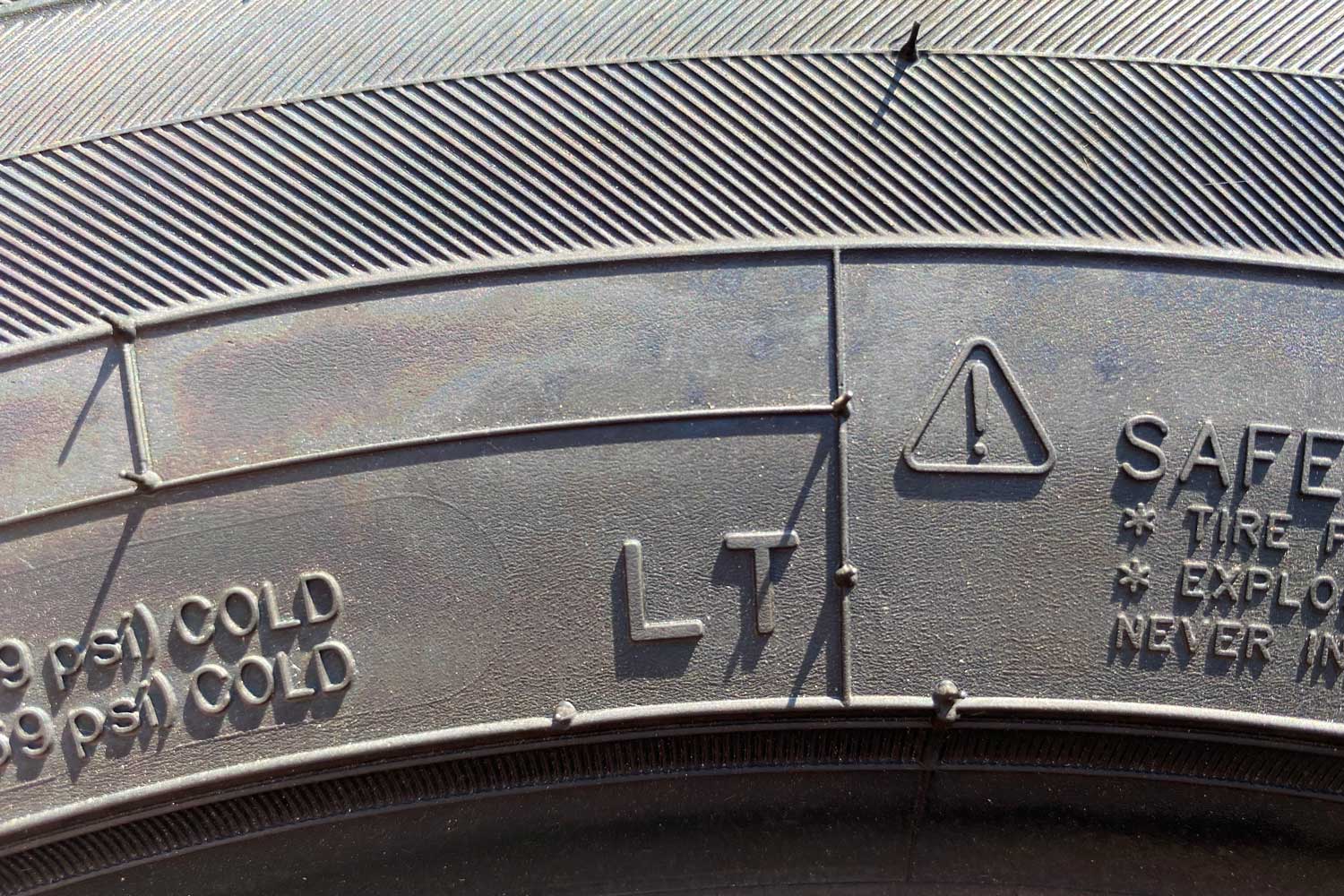Everything You Need to Know About LT Tires
If you drive a large vehicle, LT tires may even be a requirement.
 Shutterstock
Shutterstock
If you own a truck, SUV, or van, you may see an “LT” embossed on the sidewall of your tires. It’s an important classification depending on the weight of your vehicle and how you use it, so let’s take a dive into what it means and if you should consider a set of “LT” tires.
What Does LT Mean on a Tire?
An “LT” on your sidewall before that long string of numbers and letters denoting your tire size signifies the tire is a "Light Truck-metric" size; it was designed for use on a vehicle that carries heavy cargo loads or tows a large trailer.
A tire size that ends with an LT means it’s a special kind of “Flotation Light Truck” tire that can also handle heavy loads and towing, but the tread pattern is engineered to prioritize off-road traction to “float” over sandy surfaces and loose sediment. This will come at the expense of maximizing on-road traction and longevity — so unless you are regularly driving through fields, a flotation LT tire is not ideal for you.
Alternatively, the tire size might start with a “P” for “P-metric,” meaning it was designed for fit on a vehicle that’s primarily used as a passenger vehicle. However, many light-duty trucks, SUVs, and vans come fitted with passenger tires.
How Are LT Tires Different from Passenger Tires?
There are a number of differences, but it really boils down to construction. LT tires are built with beefed-up internal belts and cords enabling them to shoulder the extra load. The rubber compound can also differ as LT tires will endure more heat generated from carrying more weight.
On the outside, LT tires typically look different than passenger tires, recognizable by the squared-off shoulders as well as a deeper and more aggressive tread pattern. They can generate an increase in road noise — especially on the highway.
You can expect LT tires to ride stiffer than a passenger tire due to their heavy-duty construction and higher inflation specification. They can also affect fuel mileage since it takes more energy to turn a heavier LT tire.
Do I Need LT Tires on My Truck or SUV?
The answer to this question depends on several factors. If you tow a heavy trailer or drive a vehicle packed with people and cargo, LT tires are an excellent choice — especially because they can improve handling while under that heavy load.
For those with ¾- or 1-ton class vehicles, it was most likely engineered and built with LT tires, in which case you do need LT tires. But if you drive a small or mid-size SUV/crossover that’s used as a runabout or commuter, LT tires aren’t necessary or even ideal for your usage.
It’s important to note that LT tires do not increase the overall load capacity of your vehicle. The vehicle itself has a load capacity that should not be exceeded. Be sure to check the sticker in your driver’s door jam or refer to your owner’s manual for maximum weight and load ratings, as well as original tire sizing and classification. If you have any doubts, consult a tire professional to determine what’s best for your vehicle and needs.
How Long Do LT Tires Last?
The life of any tire depends on a number of factors, including how you drive. LT tires don’t typically come with a mileage warranty from the manufacturer to use as a guide; this is likely because they are subject to a variety of heavy-duty use, making the wear unpredictable. Be prepared for LT tires to wear quicker than a typical passenger tire.
Written by humans.
Edited by humans.
 Jon Yanca
Jon YancaTo say cars have been a lifelong passion for Jon Yanca would be an understatement. Obsession is probably more fitting. He brings over 15 years of automotive-industry experience spanning from top enthusiast publications, to advertising and marketing, to independent auto repair. When Jon is not writing about cars, you'll find him racing on dirt, pavement, and even ice, or with a wrench in hand maintaining his fleet of vehicles.
Related articles
View more related articles